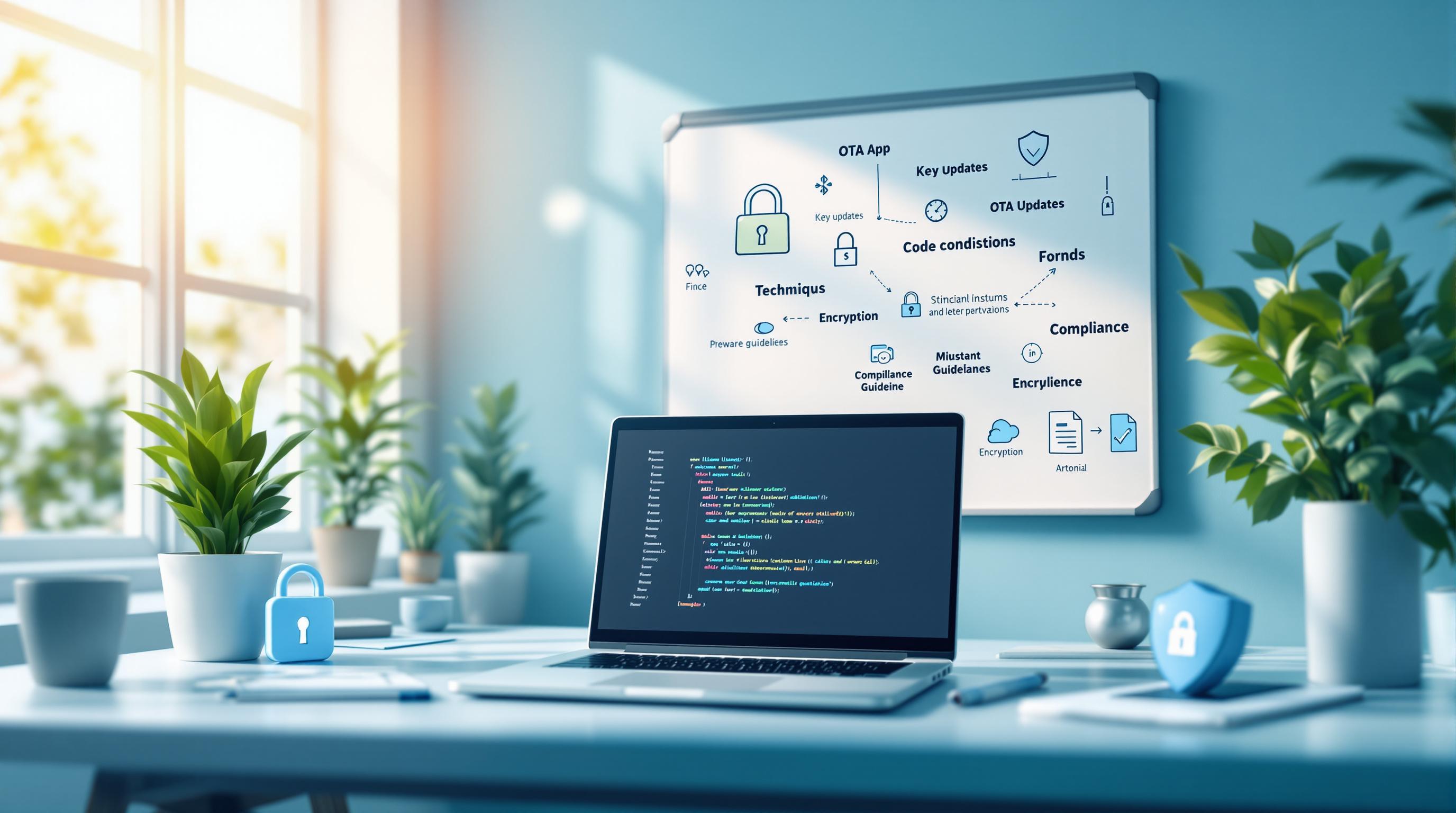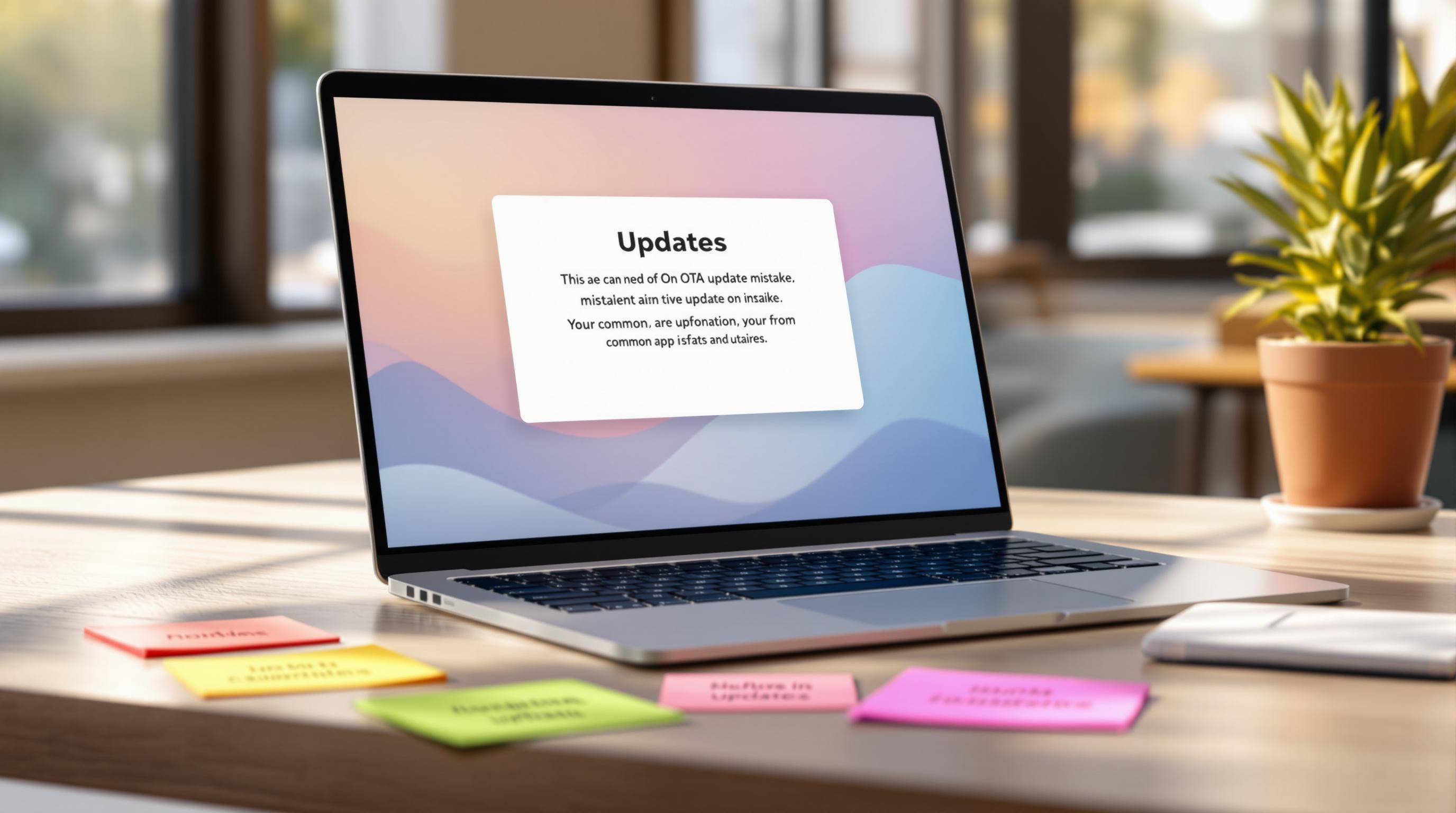Code integrity is critical for securing Capacitor apps, especially with OTA updates. Without proper measures, your app could face risks like malicious code injection, API credential theft, or binary modifications. Here’s a quick breakdown of what you need to know:
- Core Tools: Use SHA-256 digital signatures, runtime checks, and encryption (AES-256) to protect code.
- Platform-Specific Features: For Android, integrate the Play Integrity API for app verification and device attestation. For iOS, follow App Store Guideline 3.1.2 for OTA updates.
- OTA Update Security: Implement end-to-end encryption, checksum validation, and compliance tracking to secure updates.
- Recommended Tools: Tools like Capgo simplify secure OTA updates with encryption, version control, and compliance monitoring.
Quick Comparison of Key Tools and Features
| Feature | Play Integrity API | Capgo | Other Tools |
|---|---|---|---|
| Device Attestation | Yes | No | Limited |
| End-to-End Encryption | No | Yes | Basic encryption |
| Compliance Documentation | No | Automated | Manual |
| Update Validation | Partial | Full | Varies |
Code Verification Methods
Capacitor apps combine web and native verification techniques to secure code using digital signatures and encryption.
Digital Signatures and Encryption
Code verification relies on cryptographic methods. Using asymmetric cryptography, developers sign code bundles with private keys, and client devices verify them with public keys. This process often pairs SHA-256 hashing for verifying content integrity with AES-256 encryption to secure sensitive configurations.
| Verification Layer | Implementation | Security Level |
|---|---|---|
| Bundle Signing | SHA-256 + JWT tokens | High |
| Data Transport | TLS/SSL | High |
| Config Protection | AES-256 encryption | High |
| Runtime Checks | Hash verification | High |
Platform Security APIs
Capacitor builds on its native security features by leveraging platform-specific APIs. For Android, the @capacitor-community/play-integrity plugin [2] adds extra layers of verification. The setup includes:
- Generating cryptographic challenge tokens (16+ bytes).
- Configuring the Play Integrity API with a Google Cloud Project ID.
- Managing critical errors like API failures (-1), missing services (-2), or invalid tokens.
This system performs three key checks:
- Verifies app authenticity.
- Assesses device integrity.
- Confirms license validation status.
Combined Web and Native Checks
A hybrid approach enhances Capacitor’s protections by integrating Content Security Policies (CSP) for web content with tools like Free-RASP-Capacitor [3].
For production environments, developers should implement:
- Startup checksum validation.
- Real-time monitoring for code modifications.
- Encrypted validation for partial updates.
These measures ensure compliance with platform update requirements while maintaining strong security protocols.
App Store Rules and Requirements
App stores enforce strict guidelines for OTA (Over-the-Air) updates to ensure user safety. Developers must follow these rules carefully to avoid issues during app deployment and updates.
iOS and Android Guidelines
Both iOS and Android have specific requirements that align with Capacitor’s native verification methods. For iOS, App Store Review Guideline 3.1.2 governs OTA updates. While JavaScript updates are allowed under certain conditions, any functionality changes require prior approval.
Android focuses on the Play Integrity API, which provides a robust system for verifying app integrity. Here’s a quick breakdown of the key requirements for each platform:
-
iOS:
- Adherence to App Store Guideline 3.1.2
- Tracking
CFBundleVersion - Use of code signing certificates
-
Android:
- Integration of the Play Integrity API
- Validation of tokens
- Consistent package naming
Update Tracking for Compliance
Tracking updates effectively is essential for meeting app store requirements. It complements runtime integrity checks and provides a clear, auditable compliance record. Developers can maintain compliance by implementing the following:
| Tracking Component | Implementation Method | Purpose |
|---|---|---|
| Version History | Cryptographically signed timestamps | Creates an audit trail |
| Deployment Logs | Append-only audit logs | Documents compliance |
| Verification Records | Token validation receipts | Confirms integrity |
Integrating these tracking methods with CI/CD pipelines strengthens both security and documentation. This approach ensures apps meet app store verification standards while maintaining detailed audit trails.
sbb-itb-f9944d2
Code Integrity Tools
Capacitor’s native security features serve as a strong foundation, but specialized tools can further enhance protection during update workflows.
Capgo: Secure OTA Updates

Capgo is designed specifically for managing secure over-the-air (OTA) updates in Capacitor applications. It ensures code integrity with features like:
| Security Feature | How It Works | Performance Impact |
|---|---|---|
| End-to-End Encryption | Encrypts update packages | Adds <200ms latency |
| Differential Updates | Reduces update payload size | Cuts modification risks by 98% |
| Version Control | Uses cryptographic signatures | Enables real-time validation |
| Compliance Checks | Verifies app store requirements | Offers continuous monitoring |
Capgo also integrates seamlessly with CI/CD pipelines, automating verification during deployments. Its compliance checks directly address iOS 3.1.2 and Android Play Integrity rules, ensuring adherence to platform guidelines.
Tool Comparison
When choosing a code integrity tool for Capacitor apps, it’s crucial to weigh their features and ease of implementation:
| Feature | Capgo | Other Tools |
|---|---|---|
| Update Protection | End-to-end encryption | Basic encryption |
| Runtime Security | Optional add-ons available | Limited options |
| Compliance Documentation | Automated tracking | Requires manual processes |
| Integration Complexity | Simple NPM package install | Varies widely |
| Verification Speed | <200ms | Performance varies |
Experts recommend using multiple tools to create a layered approach tailored to your specific security needs.
“The combination of Play Integrity for device attestation and specialized update validation through tools like Capgo creates a robust security framework.”
When selecting a tool, consider the trade-offs between security features and operational demands. Open-source options like Capgo offer transparency and customization but require managing your own infrastructure. On the other hand, commercial solutions might simplify management but lack advanced features like update encryption.
Code Integrity Guidelines
Maintaining code integrity in Capacitor apps requires a smart mix of monitoring systems and balancing security with performance. Development teams must adopt practical, scalable approaches that meet strict security requirements while keeping their apps running smoothly.
These guidelines go beyond app store requirements by turning compliance into actionable technical measures.
Monitoring Systems
Effective monitoring involves using multiple layers of checks, combining automated tools with manual audits. A key tool here is the Google Play Integrity API, which offers device-level attestation with response times under 200ms [1][2].
| Monitoring Layer | Implementation |
|---|---|
| Device Attestation | Play Integrity API |
| Binary Verification | Checksum validation |
| Update Validation | Cryptographic signatures |
To enhance security, teams should integrate automated checks into their CI/CD pipelines. Some best practices include:
- 90% test coverage for security-critical sections [5]
- Mandatory code reviews for all updates
- Emergency patch deployment within 24 hours
These layers work together to create a strong, multi-faceted defense system.
Security vs Speed
Finding the right balance between security and performance is a challenge, especially when using update tools and APIs. Optimizing performance metrics without compromising security is key.
| Performance Metric | Target Threshold | Optimization Method |
|---|---|---|
| Cold Start Delay | <300ms | Parallel security initialization |
| Memory Overhead | <15MB RAM | Efficient library use |
| Verification Latency | <200ms | Token caching (2-4 hour TTL) |
| Background Monitoring | Minimal impact | Event-driven checks |
Here are a few strategies to ensure both speed and security:
- Progressive Verification: Start with basic signature checks before diving into full cryptographic validation [2].
- Risk-based Authentication: Tailor verification intensity based on risk signals, such as unusual user locations or device profiles.
- Offline-compatible Validation: Make sure your system works even with poor network conditions by caching essential security tokens and using fallback mechanisms.
Continuous monitoring and adjustments are critical. Weekly security reviews [3] paired with automated vulnerability scans can help maintain this balance between protection and performance.
Summary
Protecting the code integrity of Capacitor apps requires a mix of platform-native features and specialized tools:
The Play Integrity API offers device-level attestation with response times under 200ms, ensuring Google-verified app legitimacy [1][2]. Complementing this, runtime verification tools like freeRASP provide real-time detection of compromised environments [3][4].
For teams managing OTA updates, using end-to-end encryption and automatic checksum validation is crucial. Combining these platform features with specialized tools enables secure updates while supporting fast deployments.
To balance security and app performance, development teams should focus on:
- Secure communication between app components
- Validated token generation to prevent misuse
- Real-time monitoring of app environments
- Adhering to platform-specific guidelines
This approach ensures strong protection without sacrificing performance, laying the groundwork for reliable updates and secure app maintenance.




